Some stories from healthcare founders
Get Out-Of-Pocket in your email
Looking to hire the best talent in healthcare? Check out the OOP Talent Collective - where vetted candidates are looking for their next gig. Learn more here or check it out yourself.
 Hire from the Out-Of-Pocket talent collective
Hire from the Out-Of-Pocket talent collectiveHow To Contract With Payors
.gif)
Featured Jobs
Finance Associate - Spark Advisors
- Spark Advisors helps seniors enroll in Medicare and understand their benefits by monitoring coverage, figuring out the right benefits, and deal with insurance issues. They're hiring a finance associate.
- firsthand is building technology and services to dramatically change the lives of those with serious mental illness who have fallen through the gaps in the safety net. They are hiring a data engineer to build first of its kind infrastructure to empower their peer-led care team.
- J2 Health brings together best in class data and purpose built software to enable healthcare organizations to optimize provider network performance. They're hiring a data scientist.
Looking for a job in health tech? Check out the other awesome healthcare jobs on the job board + give your preferences to get alerted to new postings.
This episode of Out-Of-Pocket is brought to you by…
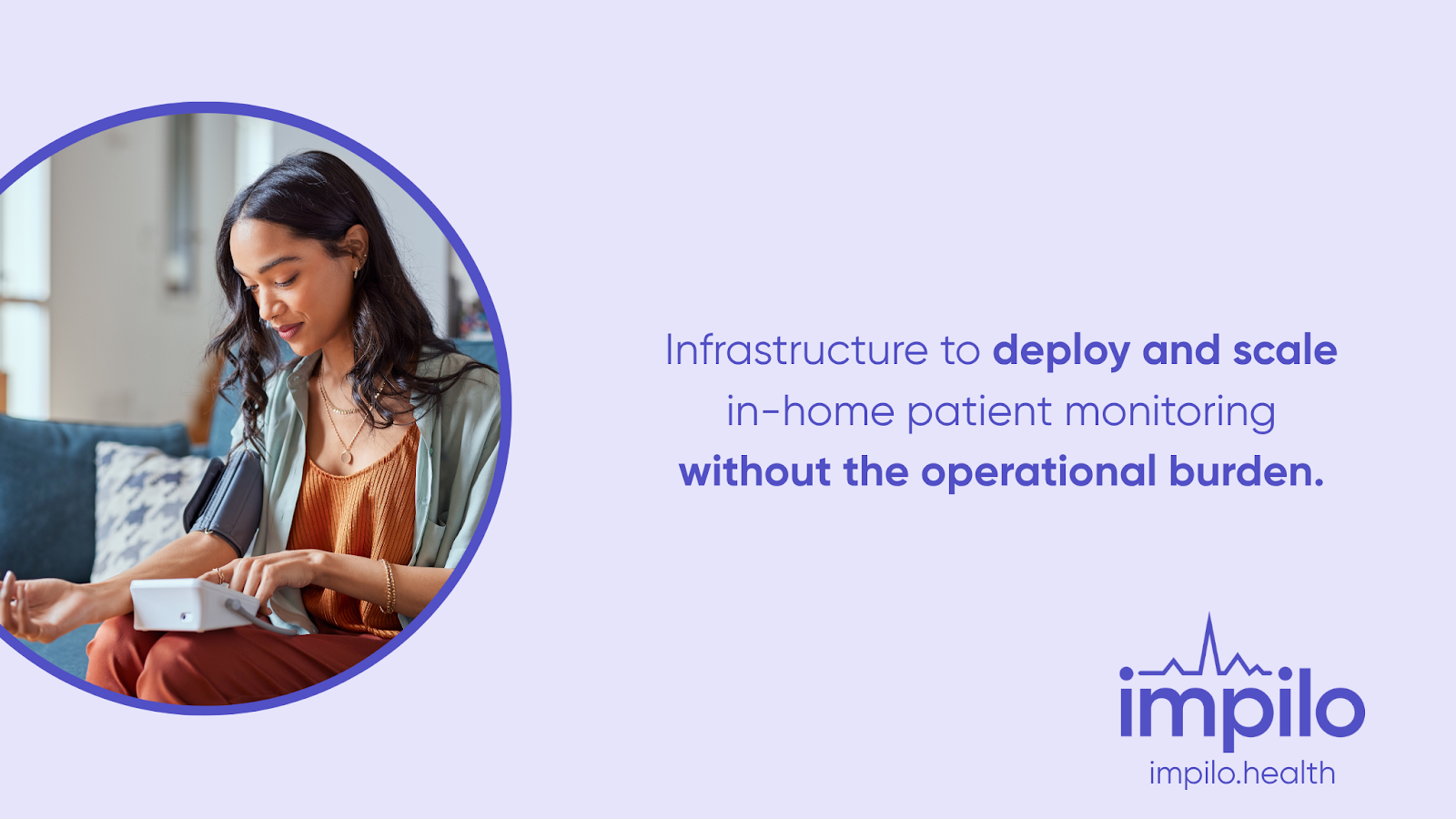
Impilo provides the infrastructure to deploy and scale in-home patient monitoring and remote care. We manage brand-agnostic medical supply procurement, logistics, technical support, and seamless API integration, ensuring that real-time clinical data flows directly into your existing systems and workflows.
Our platform eliminates the operational and technical burden of remote care delivery, allowing your team to focus on providing high-quality, patient-centered clinical care—on a large scale, at home, and without compromise.
—
Lessons
Last time I shared some lessons I’ve learned and heard from healthcare founders over the years. I asked you all to share something about starting a company that you wish people told you earlier on, and you did not disappoint.
Some commentary and memes from me.
Startups are not families
“1) Your team is not your family. There is a clear hierarchy and your staff feels it every payday. Employees can care about your mission and they are still relying on you to feed their real family. When progress is up and to the right, it may feel like a family, but that quickly changes when the roller coaster is dropping.
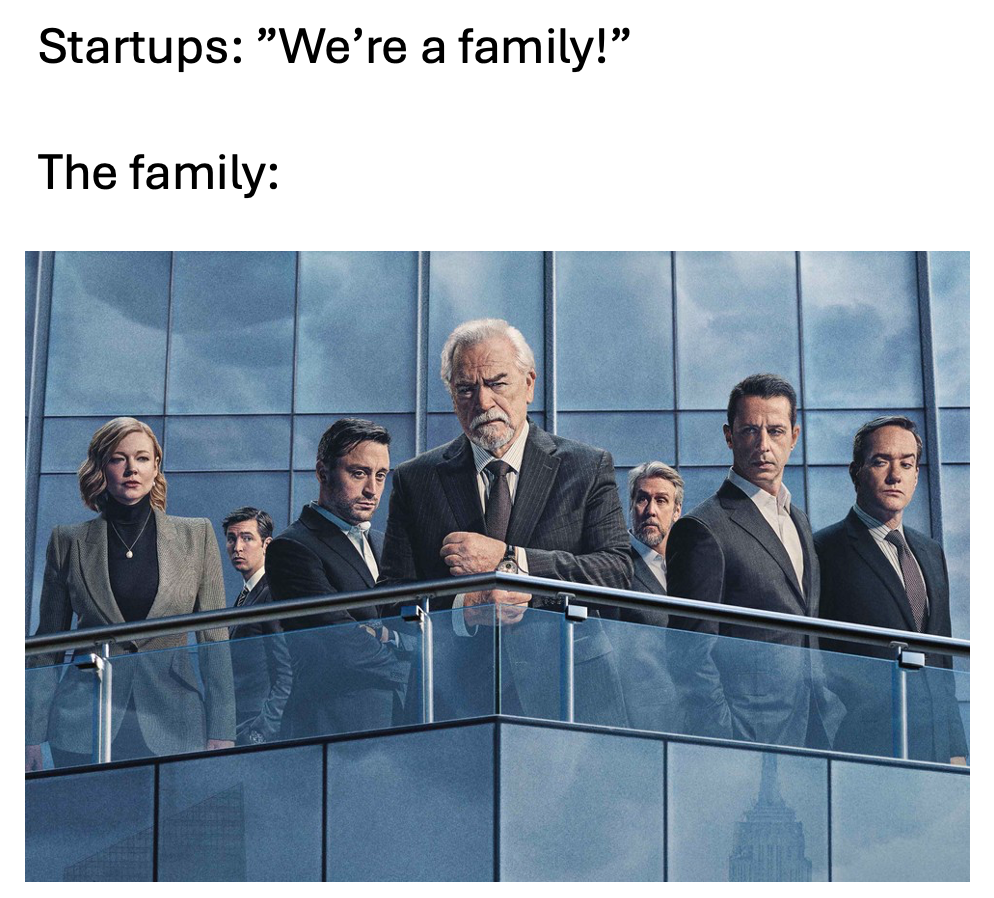
2) As headcount climbs, so does every possible issue on the human spectrum. Grief, rivalry, greed, and a level of drama that feels like High School Musical. You can lower the volume with clear policies and quick action, but you cannot mute it forever.
3) No one gives a shit. The outside world barely notices your daily grind. Everyone on X is closer to a performing arts major than succeeding in their startup. 99% of people doing the grunt work are not broadcasting it to the world for likes.
4) Finally, nothing drains hours as a founder like state payroll portals and other government sites. Multiply that pain by every state where you hire and you spend an ungodly amount of time perusing websites that for some odd reason are closed at certain hours of the day.
With all that said, I would still start another company and feel that as a second time founder, I will be way better prepared for these issues.”
[NK note: Startups are the families in the way “step sis what are you doing” are families. It’s for show, but people are really just doing their jobs.
Also I deeply empathize with the state payroll point. I actually understand why there are so many companies that exist just to deal with state portals. In order to update our business address in New York, we had to sequentially update the IRS first and then New York state only after we got the notice (because NY state checks against the IRS). I was adamant against paying $100 to a company to do this for us, but after being in two government portals I’m now questioning whether I’m a libertarian.]
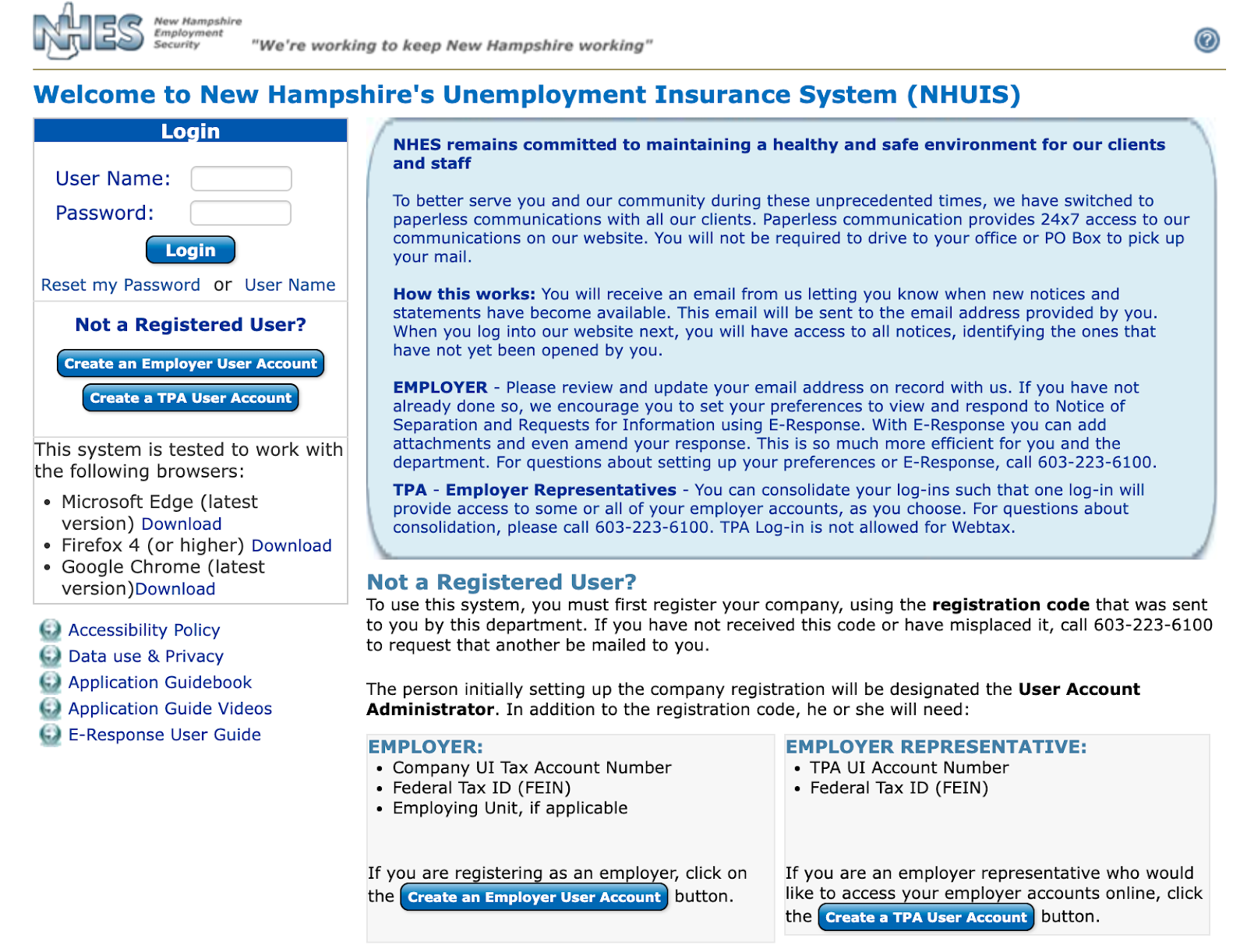
{{interlude 11}}
They’re all sold out (hackathon invites are going out this week). We have room for a handful of sponsors for each of them.
If you’re curious what pricing looks like for any of the above, what you get for it, etc. email sales@outofpocket.health. We’re also sold out for basically all of the rest of OOP sponsorship inventory for the rest of the year, so if you want to work with us on something this year, this is your chance!
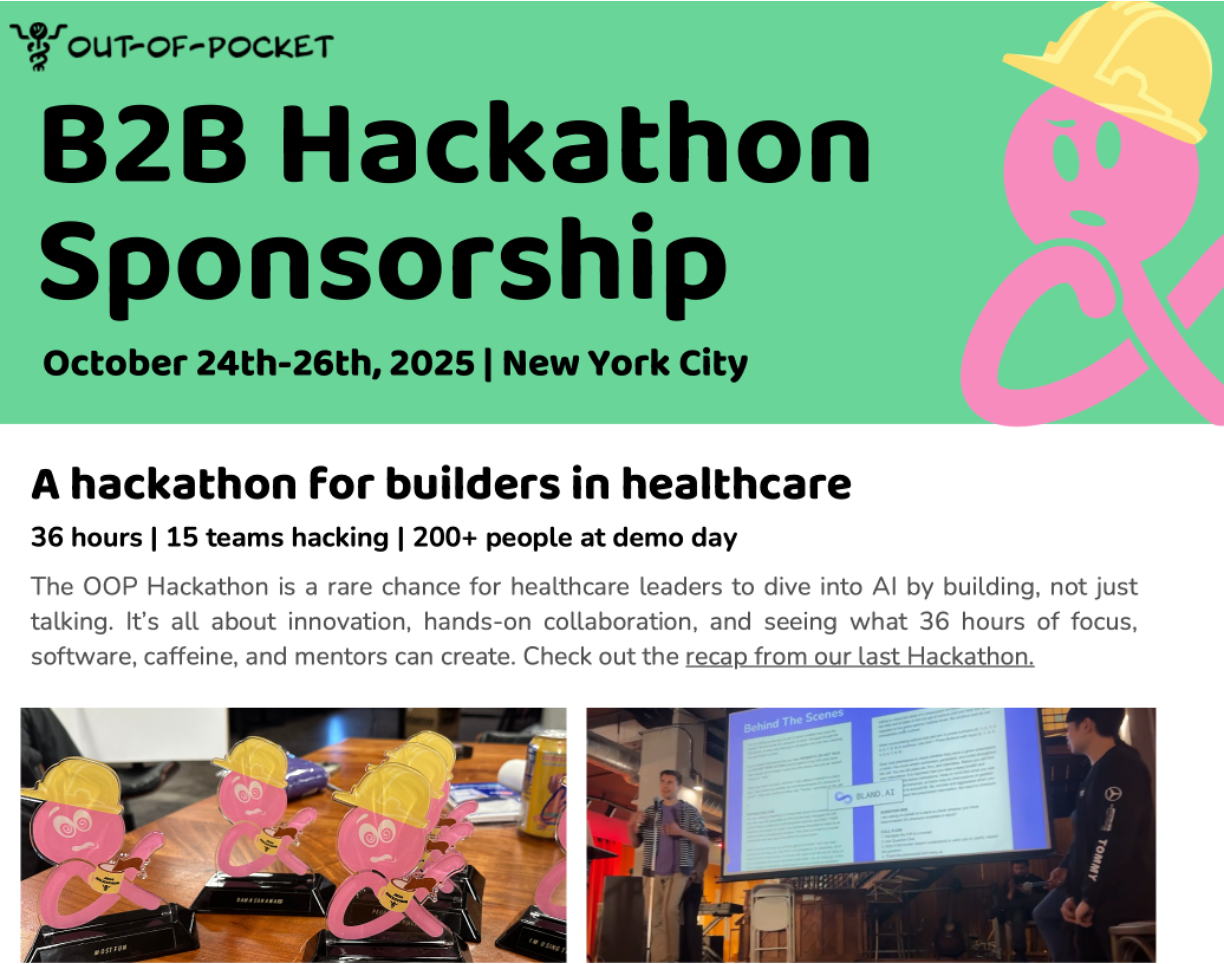
Separately, our LLMs in healthcare course starts 9/8. This area keeps changing, so we’re constantly updating the course.
Everyone’s going to be out in like 2 weeks, so if you want to convince your boss or get budget for your employees, you should start asking now! Also email sales@outofpocket.health for group discounts.
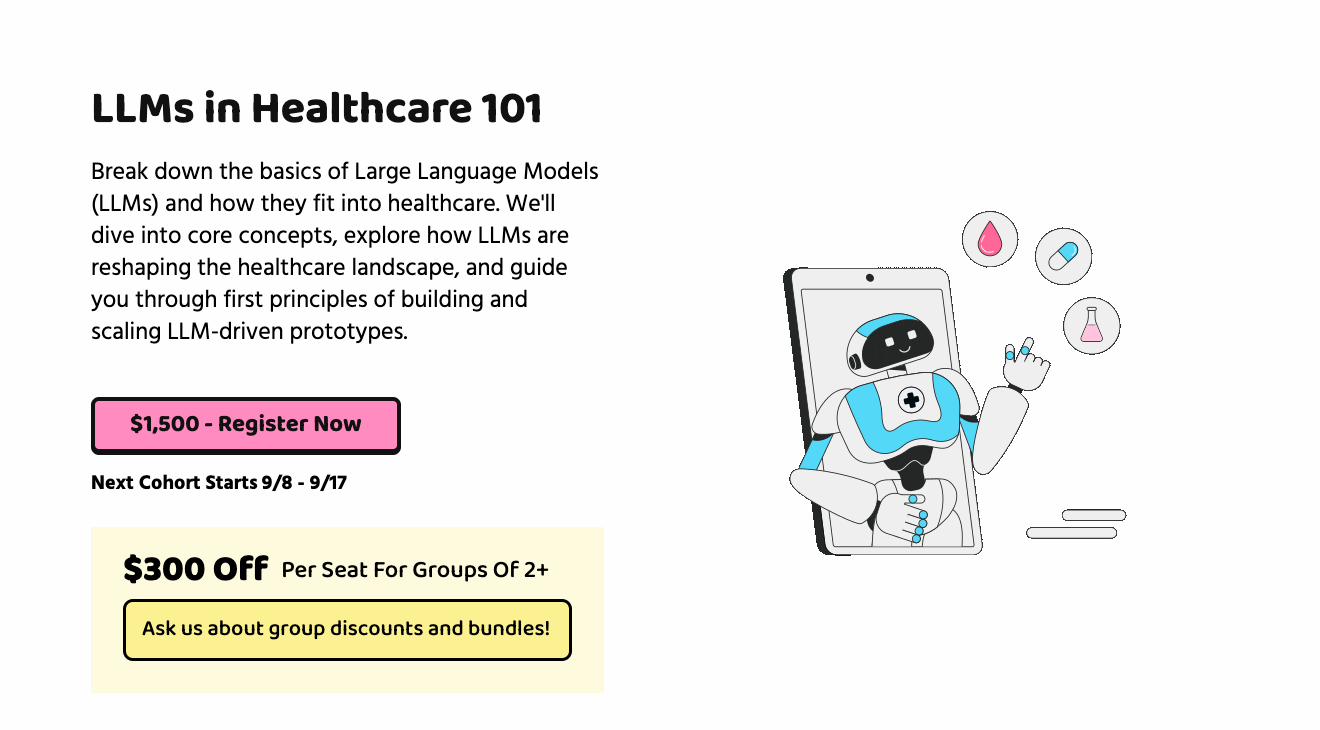
Do the low status things
“Share the risk / do the low status things. For older founders especially, it is super hard to do things that could be perceived as low status by your peers. My biggest mistake was under capitalizing my first startup because I wanted to prove that I could do it on my own so I self-financed for too long.
I see a lot of older founders also try to go too big too soon instead of doing non-scaleable things first. I advised a founder who had a successful app for beef farmers that could 3X their revenue. He had 150 devoted users, but was having trouble getting more and wanted to raise $5MM for a nationwide marketing campaign because that's what you are supposed to do as a startup.
I challenged him to grow by 10% that weekend to make sure that there weren't issues with onboarding even if it meant taking the farmers phones and loading the app for them. The founder came back the next week and shared that he went to an event and tried to get 15 farmers to load his app, and he found out that most of these guys didn't know how to load an app onto their phones. He would have wasted $5MM, but instead he hired a bunch of inexpensive interns that helped the old farmers to load the app onto their phones
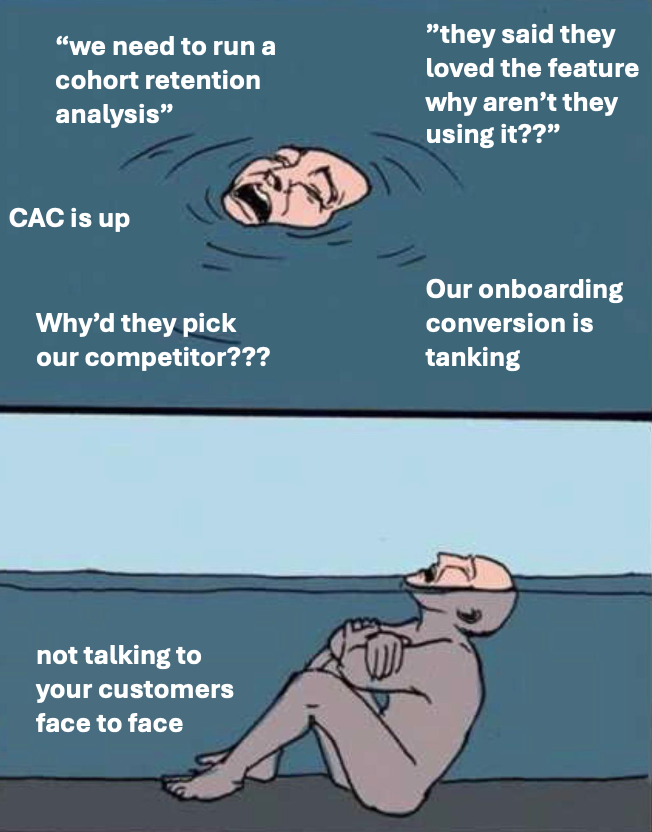
Last one: Specific knowledge is crucial for healthcare startups. You wouldn't start a technology startup without a tech cofounder. You shouldn't start a healthcare startup without specific-knowledge of the healthcare sector you are entering. That doesn't mean that you have to hire a clinical cofounder (though close clinical advisors are invaluable). Most times the opportunity cost is too high for clinicians to join an early stage startup anyway. Instead you or one of your cofounders should actively work in the healthcare sector you are entering to gain specific-knowledge about the space before starting the startup”
[NK Note: There are so many founders who just don’t do the hard things like fly out to meet customers, have a ground game, etc. They want to just run a playbook from their home offices, and think money solves those problems. I talked to someone recently that was pitching an idea for practices to create their own automations, and when I asked them if he’d sat in a practice to watch how it works he said no! What???
I still don’t really know if I agree with the last one, I go back and forth. I think if you don’t have domain specific knowledge you can generally make up for it with good advisors and hiring first hires with domain specific knowledge. But the issue is you need to be humble in understanding why the rules of the game exist vs. constantly berating that it should be done differently.
Ironically, I think you totally could start a technology startup with a tech cofounder today :) ]
Role names matter
“In your post on healthcare founder advice, you said "This isn’t to dissuade you from getting a co-founder - you absolutely should." I want to push back a bit and give the advice that you maybe (probably) shouldn't actually get a co-founder.
Despite this being the first company I've started, I can say confidently that while data may show that 30%+ of companies lose a co-founder over time, when it's you in that situation, it is 100% painful. Particularly if you have to fire your co-founder.
So what do I wish I would have done instead?
I wish I would have just hired my co-founders as employees the way we've hired all other employees, only with much more generous equity. I wish I would have written actual job descriptions. Not just for the sake of it, but because it would have been an invaluable practice to really think through what I needed the first employees to be capable of and responsible for in the earliest days. And it would have helped me communicate those needs and set better expectations. I should have given these roles more realistic and flexible job titles like Head of Engineering and Head of Sales, rather than CTO and COO. And I should have actually posted the jobs and tried to just hire the absolute best person I could attract, rather than someone I knew or someone I had courted as a co-founder.
I don't have any data to support the claim that you shouldn't get a co-founder, but I think it's now more possible than ever to start a company solo. In fact, given the state of AI tools, I think it's a bit of a red flag for most businesses if the entrepreneur isn't getting to MVP or proof of concept or even revenue solo and then just hiring their first employees.”
-Anonymous
[NK note: We’ve talked a bit about the rise of solo founders in the past. I totally agree with the last point - you can get pretty far without a cofounder + do interesting things with the equity pool for early employees if you’re a solo founder. I think many solo founders have gone through a cofounder breakup which is why they choose that route.
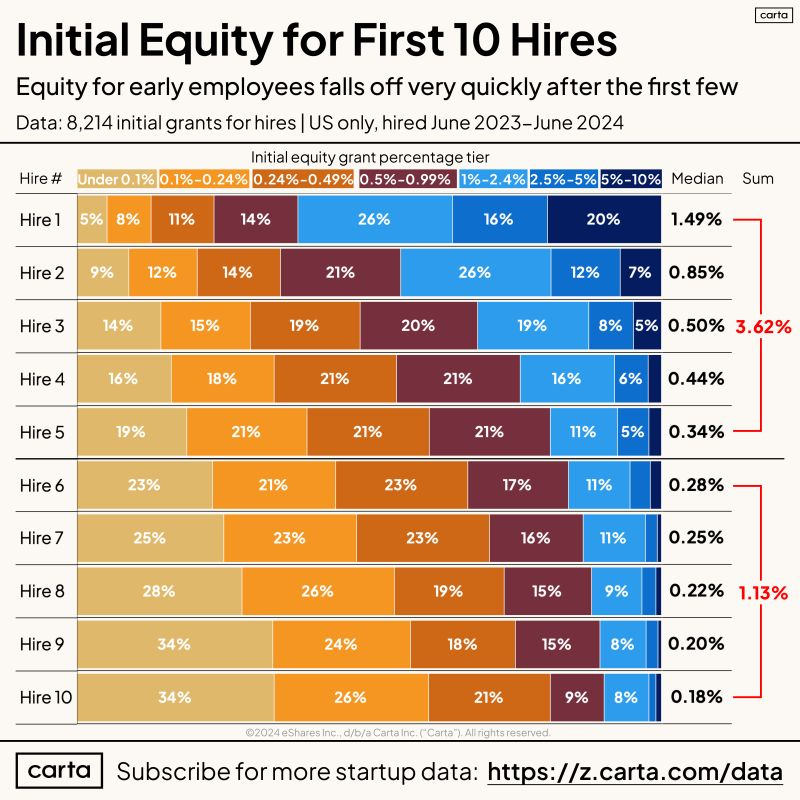
Titles matter so much more than I thought. A common trope in tech has been “titles are cheaper than salary, so give people titles”. But then you create culture debt. When suddenly people need to be hired over someone, you have to navigate some strange scenarios. I don’t recommend YOLOing startup titles, it’s worth thinking through.
And this is coming from someone whose title is “thinkboi”.]
Post Founder Unemployability?
“As soon as you start a company, you instantly become unemployable to a majority of companies. Most companies, if they do exit, are life-changing (I tell other founders it's amazing how much your life can change with an extra $250k in the bank - pay off student loans, down payment on a house, a little extra cushion in your bank account), but very few people get fuck you money. Unless you're living in a super cheap place, you will have to work again. No one will want to hire you. Why? Because your DNA was rewired over the previous X number of years in the company and it will rub people the wrong way. A reason a founder is so successful is they have internal street cred - they don't necessarily need permission from anyone to do what they want. No one wants to hire this. I know many founders post-exit do run into mental health issues adjusting to life after the company.”
- Anonymous
[NK note: I’m not sure you become unemployable - in fact I think lots of companies love the whole ex-founder thing for certain roles that have to do with internal innovation, or cool sounding things like “special projects” that works on using AI for procurement or something boring as fuck.
But I do think many founders themselves struggle to work at larger companies or for other people again, mostly because they don’t know how to navigate internal politics smartly. They don’t get that your job is to get your boss promoted, or that the optics of who presents an idea matters.]
.gif)
Do the right thing
“If you do anything patient-facing, you owe it to them to have an exit strategy if the business doesn't go as planned. They've put their trust, their data, their reputation, and their community voice into your hands. Whether that's a registry, a clinical trial, an app, or whatever, we all hope and pray that your company becomes so successful they can fulfil all the promises made. But. Nearly every startup dies or pivots away from initial promises, that's the nature of the beast. An acquisition or change of control will mean your hand will come off the steering wheel, one way or the other, so you need to have a decommissioning or handover plan that involves returning value back to the community.
In startup years a 3-5 year run might seem like a long time, but if you've been living with Parkinson's for 20 years you've seen a bunch of tech come and go. If you're a parent running a rare nonprofit you'd describe what would be a long tenure in silicon valley as "fly by night" and the space abounds with horror stories of whole disease communities that put all their data eggs in one basket and then found, a few years later, that the basket was locked. "There is no Plan B" is not ok in this space."
[NK note: Just FYI, the business reason to do this even if you’re shutting down is because many people will refuse to do business with you in the future if you don’t do this properly. Certain stains travel with you, and burning patients is one of them.
Plus there’s certain regulations (e.g. HIPAA) around what you do with the patient data, report to Medicare, etc.]
Challenge customer requirements
“Healthcare buyers often present must-have requirements that don’t actually make sense. Maybe this happens more in healthcare than other industries because the systems are especially opaque and no one’s questioned requirements in years. If you take these asks at face value, you’ll waste time building around constraints that aren’t real, and you’ll reinforce them for everyone else. The added bonus of challenging bad requirements is that doing so can help build real trust.
When we were building Ultralight (a requirements and quality management platform for medical devices), customers often said they needed specific integrations. A common one among medical device startups: “We need a Jira integration.” But when we asked why or how they planned to use it, the rationale usually fell apart. Sometimes they had never actually used Jira but wanted to in theory. Other times, the request came from a vague idea or a recycled RFP template or what larger incumbents in their space were doing.
If we had built every integration requested, we would have wasted months on features no one used. So we focused on asking questions back. What are you trying to accomplish? Where does your process break down? In most cases, we either solved the problem more simply or realized it wasn’t a big problem to begin with.
Pushing back saves time, keeps your product focused, and earns credibility with customers who think clearly.”

[NK note: I don’t think there’s any set of words that makes me see red more than “that’s just always how it’s been done”. If this wasn’t a Zoom meeting, we’d be grappling on the floor as soon as that was said.
Another added bonus of challenging requirements is that you can identify bad customers upfront. The truth is many startups die supporting bad customers in the early days that are actually terrible fits for their product. You need to fire those customers, but challenging requirements can help you avoid that fate in the first place. The customer is not always right.
Also, no one needs a Jira integration. That’s why we have all of those PHQ-9s.]
Regulation can be your friend
"When we first launched, everything looked aligned—hospital partners were on board, the legal environment seemed green-lit, and I was ready to live the founder dream (posting vaguely profound LinkedIn updates about system change and going on podcasts) Then we hit a wall. A regulation from the 1980s, enforced by a tangential regulatory body, that basically said, “Nope.”
Rather than pack it in, we decided to go full policy nerd. We read the entire history of the rule, mapped out the bureaucracy, and started cold-emailing lawmakers, regulators, and anyone with a .gov email address. Eventually, someone gave us the chance to rewrite the guideline—both to make our work possible, and frankly, to make it better. That unlocked our launch, but more than that, it put us on the radar. Regulators started asking us for input on other laws. Now, when states want to modernize this part of healthcare policy, we’re often the first call. We have written many state laws and regulations now. Turns out, rewriting regulation in your company’s favor is a hell of a selling point and competitive moat.

I learned a few lessons from this:
- Being a startup founder is not glamorous, you have to be scrappy and willing to do whatever it takes. The main reason nobody touched what my company does was simply that it was “too complicated”, “too weird”, “too messy” (Things said by Nikhil Krishnan before we launched), however this perceived fault has become one of our greatest strengths.
- If you’re building in healthcare, get close to the policy. Understand the rules, know the difference between a law and a guideline, and—if you’re persistent enough—rewrite them. In healthcare, regulatory fluency isn’t a burden. It’s a superpower."
- Anonymous
[NK Note: Laws are largely made by well-intentioned people who are doing what they think is right at that point in time.
People think laws are this thing that gets set and then you just have to deal. The reality is that many laws have just existed for a while and haven’t been updated. If you make a reasonable case and show why changing it would be good, many lawmakers are totally open to changing them. But that requires a ground game! The founder who wrote this has been talking to regulators for YEARS.
I think people in tech love to complain about regulation without trying to see if there’s a path to improving it.]
How an M&A actually happens
"Companies don’t sell, they get bought, in intentional, long and often painful processes.
We lived the old adage “companies don’t sell, they get bought” when ResMed bought Propeller. In my (limited) experience, M&A is not a random act, but a very intentional one that requires a lot of time, effort, patience and resilience. Whether they will admit it or not, at some point every founder and exec at a start up dreams of some BigCo swooping in and buying their company, making them a little (or more) money and putting them out of their current misery. Unfortunately, this almost never happens. In my experience, companies generally buy other companies that they know, have experience with, have vetted and de-risked and have a good vibe with. Companies generally buy partners, vendors or other companies where they have direct experience and have seen them work. So if you want to sell, start by partnering and building such a strong relationship with your champion that they will either get the partnership going, or get fired trying. I still know most of my B2B partner champions from Propeller days, most of whom got promoted for their work, and thankfully not fired.
When it was time to think about an exit for Propeller, we went about it intentionally. We put together a (long) list of every company that could conceivably acquire the company, wrote strategic rationales (the headline), regardless of how flimsy, and independently ranked the odds for each prospect. We already had partnerships with many, but not with a few, including ResMed, so we approached them to partner. I remember pitching a new combined offering, redesigned in ResMed branding to make them really feel it. I remember the Propeller hardware and software teams connecting one of ResMed’s devices to our cloud-based infrastructure in <1 month, compared to the months and months they had been trying on their own. We blew their minds and showed them over and over that we were great partners. We brought them in as strategic investors, in part so they had a reason to do diligence on us and get updates via Board materials. The partnership was successful, but eventually became complicated (co-development of IP!), and they made the decision to acquire us instead. It worked out well for everyone, but it did not happen by chance. There is another old adage: “Every deal dies three times before it happens”, which was also true, but that is a story for another time."
[NK note: the other adage is “I die three times every time I see someone else’s deal”. I need an EXIT!!!!!!!!!!!!!!!!!!!!!!!!!
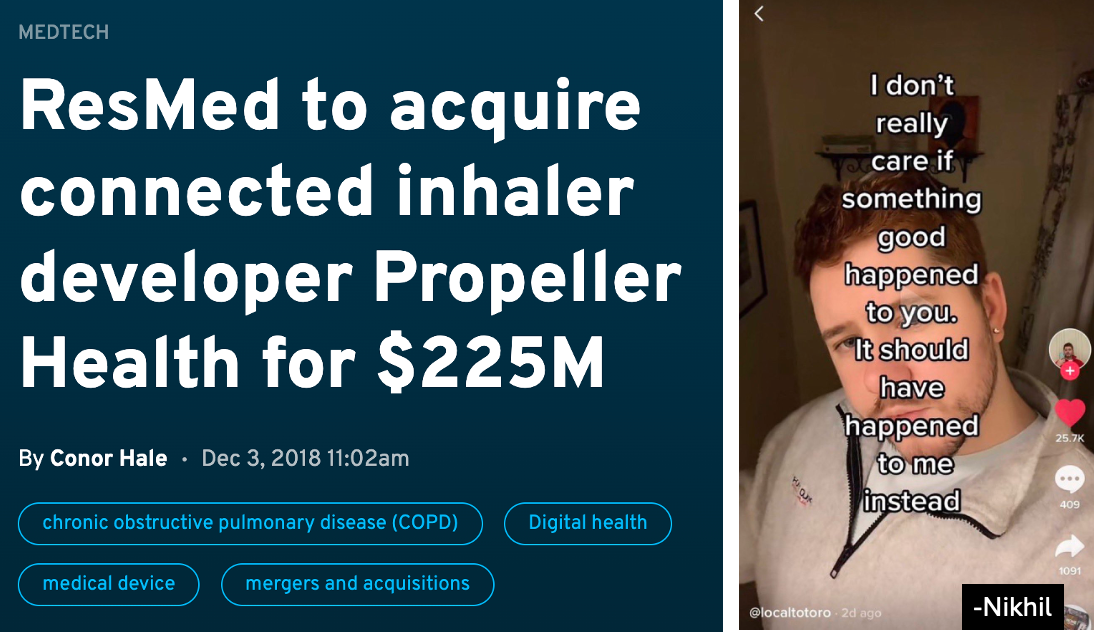
Btw I’ve heard something similar about competitors too. Most people think you need to keep your competitors extremely far away so you can beat them, but the reality is that one of your competitors can very likely become your acquirer.
I know every company wants to be huge and the story that changes how healthcare works. But maybe more founders should be thinking about how they can engineer an exit.]
Conclusion and Parting Thoughts
Idk hopefully this is some parts inspiring, some parts a warning sign.
Are you more or less likely to start something after reading this?
Thinkboi out,
Nikhil aka. “Head of Memes” aka. “My entire business is low-status things”
Twitter: @nikillinit
IG: @outofpockethealth
Other posts: outofpocket.health/posts
P.S. If you just recently incorporated your company, you should consider re-incorporating it because the new Qualified Small Business Stock tax changes are pretty significant if you incorporated after July 4th. Good explainer here.
--
{{sub-form}}
If you’re enjoying the newsletter, do me a solid and shoot this over to a friend or healthcare slack channel and tell them to sign up. The line between unemployment and founder of a startup is traction and whether your parents believe you have a job.
Interlude - Our 3 Events + LLMs in healthcare
See All Courses →We have 3 events this fall.
They’re all sold out (hackathon invites are going out this week). We have room for a handful of sponsors for each of them.
Interlude - Courses!!!
See All Courses →We have many courses currently enrolling. As always, hit us up for group deals or custom stuff or just to talk cause we’re all lonely on this big blue planet.






